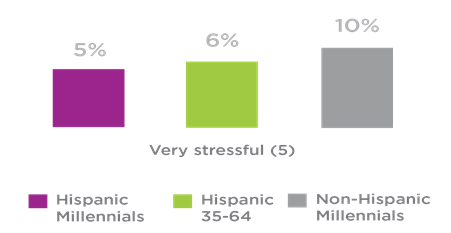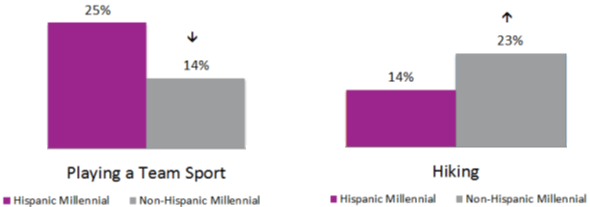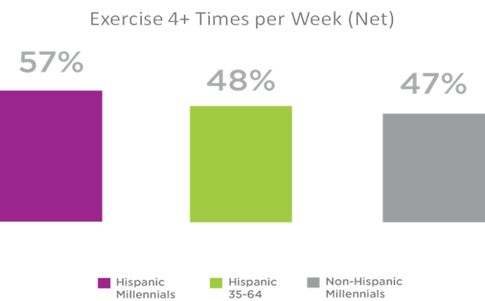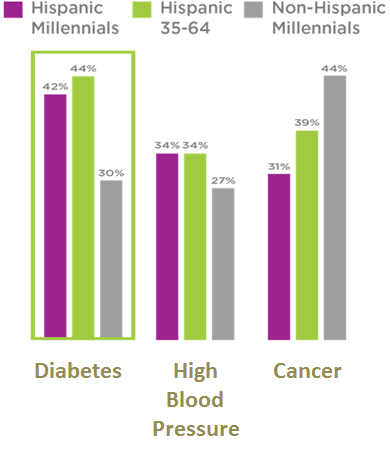The Hispanic Health Paradox – Will it Hold for Hispanic Millennials?
U.S. Hispanics, on average, live longer than non-Hispanic whites. How can this be? Non-Hispanics whites have higher income and education levels which tend to correlate with longer life expectancy. This is known as the Hispanic Health Paradox.
There are several theories as to the underlying reasons this paradox exists. Some think it’s due to the high percentage of Hispanics that are immigrants (who tend to be healthier than populations that don’t leave their countries of origin), others think it’s the fact that Hispanics smoke less than non-Hispanic whites and still others point to Hispanic culture and the close family ties most Hispanics enjoy as the source of their longevity. Regardless of the reason, here at ThinkNow Research and Sensis, we wanted to know whether the U.S. Hispanic Millennial generation would continue this long lived streak or if they exhibited behaviors and attitudes that might counter past trends.
As part of Hispanic Millennial Project we delved into health and healthcare topics to identify key points of contrast between Hispanic Millennials and their non-Hispanic White cohorts. Some of the more interesting findings include:
Hispanics Experience Less Stress
We asked respondents to rate their overall levels of stress. The number of non-Hispanic White millennials who reported their overall stress levels as very or somewhat stressful was 27% higher than their Hispanic counterparts. The non-Hispanic White group reporting that they were experiencing very high stress levels was twice that of Hispanic Millennials.

This finding seems to support the argument that Hispanic culture may play a factor in their overall health since having close family ties and large, supportive social networks correlates with better health. The desire to be around other people is a Hispanic cultural value we see across several areas of our research and is supported in this study as well. For example, we asked respondents the types of exercise they take part in regularly and saw a distinct Hispanic preference for team sports vs. solitary activities such as hiking.

A Pro-social/Positive Attitude Is Only Part of the Story
In the first wave of the Millennial Project we looked at issues related to optimism and found that 70% of Hispanic Millennials were Optimistic or Extremely Optimistic about the future compared to just 52% of non-Hispanic White Millennials. While this attitude likely contributes to positive overall health it isn’t enough to explain Hispanic longevity. Another factor seems to be that they exercise more:

Other pro-health behaviors Hispanic Millennials engage in include a 10% greater likelihood to watch their weight and a lower likelihood to consume alcohol or smoke than non-Hispanic Whites. Non-Hispanic White Millennials, however, are 24% more likely to say they take supplements. Perhaps the answer to longevity cannot be purchased in a bottle but requires putting the time in to exercise – while being surrounded by friends & family.
Diet Is Also Part of The Equation
When it comes to diet, Hispanic Millennials and their non-Hispanic cohorts focus on different things. We asked the survey respondents to rank the top three things they try to avoid consuming and we found that non-Hispanic Whites were 33% more likely to be concerned about calories while Hispanics focused their attention on saturated fats and carbs.
Interestingly, 6% of non-Hispanic Whites were concerned about Gluten vs. only 2% of Hispanic Millennials. On the flipside, when seeking out healthy foods “organic” seems to resonate more among Hispanic Millennials as they’re 25% more likely to research them online. This matches Hispanics’ overall preference for less-processed, more natural food. Diabetes? Big Concern. Cancer? Not so much.
An interesting finding among the studies that look at the Hispanic Health Paradox is that Hispanics have significantly higher survival rates when diagnosed with heart disease, diabetes, kidney disease, strokes and other medical conditions. The only exceptions are cancer and HIV/AIDS where their survival rates are similar to non-Hispanics. What are Hispanics concerned with then? Mostly Diabetes.

While Hispanic Millennials are less concerned with Cancer than Diabetes they might benefit from some public health education since skin cancer rates have increased by 20% among U.S. Hispanics over the past two decades, far exceeding the growth rate for non-Hispanic Whites. Who would they trust to deliver that public health message? Doctors. While the Internet is listed as a likely source to use when looking for health-related information or advice by around 63% of Hispanic and non-Hispanic Millennials alike, only 18% of Hispanic Millennials and 22% of non-Hispanic Millennials consider the Internet to be their most trusted source.
Doctors are used by an equal 63% of Millennials but are considered most-trusted by 53% of Hispanic Millennials and 46% of non-Hispanic Millennials.
Perhaps we’ve found the answer to Hispanics’ propensity to live longer. They’re 15% more likely to trust their doctor than non-Hispanic Millennials and 18% less likely to trust the internet. Therefore, I wouldn’t ask you to trust the Internet in this case either; please download the complete study findings and draw your own conclusions. Doctor’s orders.
Background
The Hispanic Millennial Project (HMP) is a joint research study developed by cross-cultural advertising agency Sensis and leading market research firm ThinkNow Research. The study aims to develop a better understanding of Hispanic Millennials living in the United States and dig deeper into segmentation, points of tension, and differences between U.S.-born vs. foreign-born Hispanic Millennials, as well as with older Hispanics and non-Hispanic Millennials. The study and research will be conducted and released in waves in 2014 and early 2015, where each wave will focus on a different topic relevant to this segment.
We are pleased to offer free of charge the full contents of the report referenced in this blog entry. Please click the link below to get your copy now.